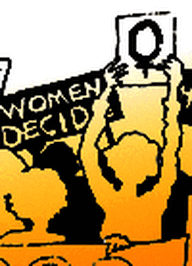Using a Reproductive Justice Lens

We know that, as immigrant women of color, Indo-Caribbean women are facing many injustices - including, but not limited to, sexual assault, immigration hardships, and poor access to healthcare. To address all of these intersecting issues, we began using the Reproductive Justice framework in our work to end gender-based oppression.
WHAT IS "REPRODUCTIVE JUSTICE"?
Reproductive Justice (RJ) is a movement that works to ensure we have the social, political, and economic power to choose whether to have or not have children, and to parent the children we have with dignity in safe and healthy environments. It seeks to ensure we have self-determination over our gender, bodies, sexuality, and families and recognizes that all forms of inequality limit our ability to control our reproductive destinies. In sum, it says that WE, not people in power who don't represent our interests, need to set the agenda for the issues that matter to us most.
HISTORY OF THE REPRODUCTIVE JUSTICE MOVEMENT
During the 1990s, the Reproductive Justice movement was started by women of color who felt that the pro-choice movement, focused on abortion rights, failed to address the ways reproductive injustice and oppression manifests in communities of color like ours. For example, the impact of economic disparity, immigration policy, and discrimination based on race and sexual orientation on women's decision-making were ignored by the pro-choice movement. Reproductive Justice has a more holistic, inclusive vision for women and girls, and aims to achieve self-determination over our reproductive selves in all respects - from preventing rape and sexual assault to changing harsh immigration policies that tear families apart.
OUR REPRODUCTIVE JUSTICE WORK
WHAT IS "REPRODUCTIVE JUSTICE"?
Reproductive Justice (RJ) is a movement that works to ensure we have the social, political, and economic power to choose whether to have or not have children, and to parent the children we have with dignity in safe and healthy environments. It seeks to ensure we have self-determination over our gender, bodies, sexuality, and families and recognizes that all forms of inequality limit our ability to control our reproductive destinies. In sum, it says that WE, not people in power who don't represent our interests, need to set the agenda for the issues that matter to us most.
HISTORY OF THE REPRODUCTIVE JUSTICE MOVEMENT
During the 1990s, the Reproductive Justice movement was started by women of color who felt that the pro-choice movement, focused on abortion rights, failed to address the ways reproductive injustice and oppression manifests in communities of color like ours. For example, the impact of economic disparity, immigration policy, and discrimination based on race and sexual orientation on women's decision-making were ignored by the pro-choice movement. Reproductive Justice has a more holistic, inclusive vision for women and girls, and aims to achieve self-determination over our reproductive selves in all respects - from preventing rape and sexual assault to changing harsh immigration policies that tear families apart.
OUR REPRODUCTIVE JUSTICE WORK
- The Young Women's Leadership Institute
- Campaign for Healthy Youth
- Repro Justice Sister Circle Series

